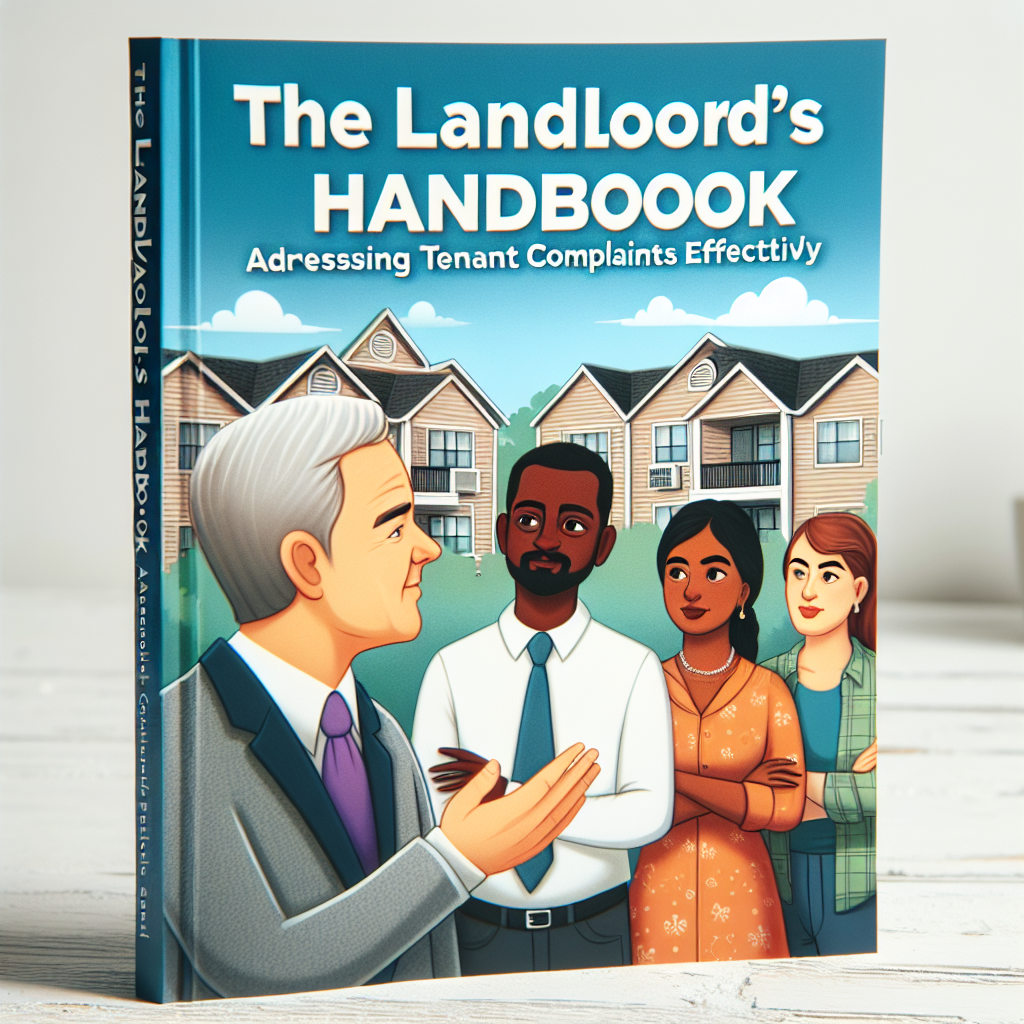-
Table of Contents
- The Landlord’s Handbook: Addressing Tenant Complaints Effectively
- Understanding the Importance of Addressing Tenant Complaints
- Benefits of Effective Complaint Management
- Common Types of Tenant Complaints
- Maintenance and Repairs
- Noise Complaints
- Safety and Security Concerns
- Pest Infestations
- Steps to Address Tenant Complaints Effectively
- 1. Establish Clear Communication Channels
- 2. Acknowledge the Complaint Promptly
- 3. Assess the Complaint
- 4. Take Action
- 5. Follow Up
- Case Studies: Effective Complaint Management in Action
- Case Study 1: Maintenance Issue Resolution
- Case Study 2: Noise Complaint Mitigation
- Statistics on Tenant Complaints and Their Impact
- Best Practices for Preventing Tenant Complaints
- Regular Property Inspections
- Clear Lease Agreements
- Open Communication
- Invest in Quality Maintenance
- Legal Considerations for Handling Tenant Complaints
- Fair Housing Laws
- Habitability Standards
- Documentation
- Conclusion
The Landlord’s Handbook: Addressing Tenant Complaints Effectively

Being a landlord comes with a myriad of responsibilities, one of the most critical being the effective handling of tenant complaints. Addressing these concerns promptly and efficiently not only ensures tenant satisfaction but also helps in maintaining a positive landlord-tenant relationship. This article delves into the best practices for managing tenant complaints, supported by relevant examples, case studies, and statistics.
Understanding the Importance of Addressing Tenant Complaints
Tenant complaints can range from minor issues like a leaky faucet to major concerns such as safety hazards. Ignoring these complaints can lead to tenant dissatisfaction, increased turnover rates, and even legal issues. According to a survey by the National Multifamily Housing Council, 60% of tenants cited maintenance issues as a primary reason for moving out. Therefore, addressing complaints effectively is crucial for tenant retention and overall property management success.
Benefits of Effective Complaint Management
- Tenant Retention: Satisfied tenants are more likely to renew their leases, reducing turnover costs.
- Positive Reputation: A landlord known for addressing complaints promptly will attract more tenants.
- Legal Protection: Properly handling complaints can protect landlords from potential lawsuits.
- Property Maintenance: Timely resolution of issues helps in maintaining the property’s condition.
Common Types of Tenant Complaints
Understanding the common types of tenant complaints can help landlords prepare and respond more effectively. Here are some of the most frequent issues:
Maintenance and Repairs
Maintenance issues are the most common complaints landlords receive. These can include:
- Leaky faucets or pipes
- Broken appliances
- Heating or cooling system malfunctions
- Electrical problems
Noise Complaints
Noise complaints often arise in multi-unit buildings. These can be due to:
- Loud neighbors
- Construction work
- Street noise
Safety and Security Concerns
Tenants may report issues related to their safety and security, such as:
- Broken locks
- Poor lighting in common areas
- Suspicious activities
Pest Infestations
Pest problems can be a significant concern for tenants. Common pests include:
- Rodents
- Insects
- Bedbugs
Steps to Address Tenant Complaints Effectively
Addressing tenant complaints requires a systematic approach. Here are the steps landlords can follow to ensure effective complaint management:
1. Establish Clear Communication Channels
Ensure tenants know how to report complaints. This can be through:
- Phone calls
- Online portals
- In-person visits
Having multiple channels ensures that tenants can report issues conveniently.
2. Acknowledge the Complaint Promptly
Respond to complaints as soon as possible. Acknowledging the issue shows tenants that their concerns are taken seriously. A simple email or phone call can suffice.
3. Assess the Complaint
Evaluate the severity and urgency of the complaint. Some issues may require immediate attention, while others can be scheduled for later. For example:
- Urgent: Broken locks, no heating in winter
- Non-Urgent: Minor cosmetic repairs
4. Take Action
Once the complaint is assessed, take appropriate action. This may involve:
- Hiring a professional for repairs
- Addressing noise complaints with the involved parties
- Improving security measures
5. Follow Up
After resolving the issue, follow up with the tenant to ensure they are satisfied with the solution. This step is crucial for maintaining a positive relationship.
Case Studies: Effective Complaint Management in Action
Case Study 1: Maintenance Issue Resolution
In a multi-unit apartment complex, tenants frequently complained about slow responses to maintenance requests. The property management company implemented an online portal for reporting issues, which streamlined the process. They also hired additional maintenance staff to handle the increased volume of requests. As a result, the average response time decreased from 72 hours to 24 hours, leading to a 30% increase in tenant satisfaction.
Case Study 2: Noise Complaint Mitigation
A landlord of a downtown apartment building received numerous noise complaints due to nearby construction. To address this, the landlord provided tenants with noise-canceling window inserts and offered temporary rent reductions during the construction period. This proactive approach not only reduced complaints but also improved tenant retention rates.
Statistics on Tenant Complaints and Their Impact
Understanding the broader impact of tenant complaints can help landlords prioritize their efforts. Here are some relevant statistics:
- According to a survey by Rent.com, 44% of tenants have moved out due to unresolved maintenance issues.
- The same survey found that 30% of tenants cited noise as a primary reason for moving out.
- A study by the National Apartment Association revealed that properties with proactive maintenance programs have a 20% higher tenant retention rate.
Best Practices for Preventing Tenant Complaints
While addressing complaints is essential, preventing them in the first place is even better. Here are some best practices for landlords:
Regular Property Inspections
Conduct regular inspections to identify and address potential issues before they become major problems. This proactive approach can prevent many common complaints.
Clear Lease Agreements
Ensure that lease agreements clearly outline tenant and landlord responsibilities. This can prevent misunderstandings and disputes.
Open Communication
Maintain open lines of communication with tenants. Encourage them to report issues promptly and assure them that their concerns will be addressed.
Invest in Quality Maintenance
Invest in quality maintenance services to ensure that repairs are done correctly the first time. This can prevent recurring issues and tenant dissatisfaction.
Legal Considerations for Handling Tenant Complaints
Landlords must be aware of their legal obligations when handling tenant complaints. Here are some key considerations:
Fair Housing Laws
Ensure that all tenants are treated equally and fairly, regardless of race, religion, gender, or other protected characteristics. Discrimination in handling complaints can lead to legal issues.
Habitability Standards
Landlords are legally required to maintain their properties in a habitable condition. This includes addressing issues like plumbing, heating, and safety hazards promptly.
Documentation
Keep detailed records of all complaints and actions taken. This documentation can be crucial in case of legal disputes.
Conclusion
Effectively addressing tenant complaints is a cornerstone of successful property management. By understanding the common types of complaints, following a systematic approach to resolution, and implementing preventive measures, landlords can ensure tenant satisfaction and maintain a positive reputation. The case studies and statistics highlighted in this article underscore the importance of proactive and responsive complaint management. Ultimately, a landlord who prioritizes tenant concerns fosters a harmonious living environment, leading to long-term success in property management.
In summary, the key takeaways for landlords are:
- Establish clear communication channels for reporting complaints.
- Acknowledge and assess complaints promptly.
- Take appropriate action and follow up with tenants.
- Implement preventive measures to reduce the occurrence of complaints.
- Be aware of legal obligations and maintain thorough documentation.
By adhering to these principles, landlords can effectively manage tenant complaints, ensuring a positive and productive landlord-tenant relationship.








